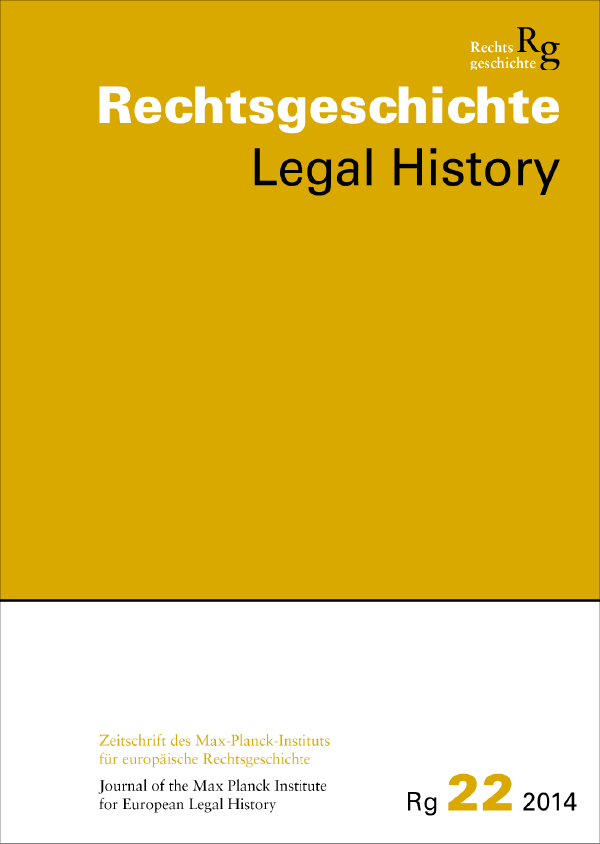Editorial
DOI:
https://doi.org/10.12946/rg22/005-007Abstract
It is a tradition within the Max-Planck-Society to commemorate the anniversary of an institute on the day its founding director accepted his or her nomination. And it was fifty years ago, in 1964, that Helmut Coing has done so. Since Coing’s days, European Legal History has emerged as a powerful field within transnational legal history, and our Institute has been pivotal to this movement. Half a century later, we have not only been able to build upon this tradition, draw on its results, overcome some of its shortcomings, and open ourselves up to global perspectives. We are also able to do that in a stimulating new working environment in the heart of Frankfurt, on the edge of the Westend-Campus of Goethe University, where our new building is located. Attentive readers of Rg may have witnessed the restructuring of our research perspectives, elaborated in the 20 (2012) issue, and found out about our Institute’s relocation from a series of images published in the 21 (2013) issue as well as in two journal sections: Focus on ›Baptism and Law‹ and Forum on ›Law and Revolution – revisited‹.
The inauguration of the Institute’s new building in September 2013 was a welcome opportunity to invite scholars from different disciplinary traditions and fields of study to exchange ideas on the necessity of opening up legal history for global perspectives, and thus for other modes of normativity. We did so under the title »European Normativity – Global Historical Perspectives«. Not all contributions in this volume grew out of conference presentations. Some were included as they enriched and expanded the range of perspectives generated at the conference, for instance, on Chinese legal history and its complex relationship with Western traditions. Together, the contributions in this issue provide us with a wide range of methodological and conceptual reflections, as well as case studies on the intense entanglements between normative orders we for a long time had regarded as separate. And especially in consideration of the 19th and 20th century context of colonialism, that we lived in an intensely connected world is evident in this issue’s illustration, which depicts a small collection of stamps that travelled around the world, bringing news, images, and ideas from one place to another. In the review-section, we focus on important new publications in transnational legal history, and we are very happy to provide a number of extensive critical assessments on the results of the powerful international research on emergent, yet influential, field of transnational legal history.
Nevertheless, any transnational scholarship relies on specific, often national, traditions. Thus, we need to reflect upon our own traditions, cultivate them, search for their place in the emerging transnational arena, and explain them to scholars from different traditions. For this reason, I have tried, in the introductory article of this issue, to provide an overview of some of the analytical traditions within our discipline from a German perspective. In doing so, I have paid special attention to the important changes in the German science and legal system during the last 25 years, the challenges resulting from these transformations in light of what research tells us about the history of knowledge creation in the last decades, namely that content relies on the conditions of knowledge production. The transnationalization of law and legal scholarship opens up fascinating perspectives for our discipline. The 50th anniversary of the Max-Planck-Institute for European Legal History this year, and coincidentally also the 100th anniversary of Frankfurt Goethe University, provides an excellent occasion to review some aspects of a centuryold tradition of legal-historical research in Germany in order to advance future research perspectives.
Downloads
Published
How to Cite
Issue
Section
License
Copyright (c) 2014 Author

This work is licensed under a Creative Commons Attribution-NonCommercial-NoDerivatives 3.0 Unported License.





